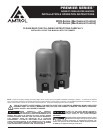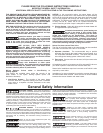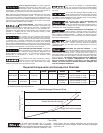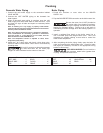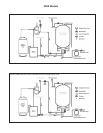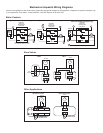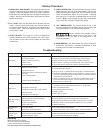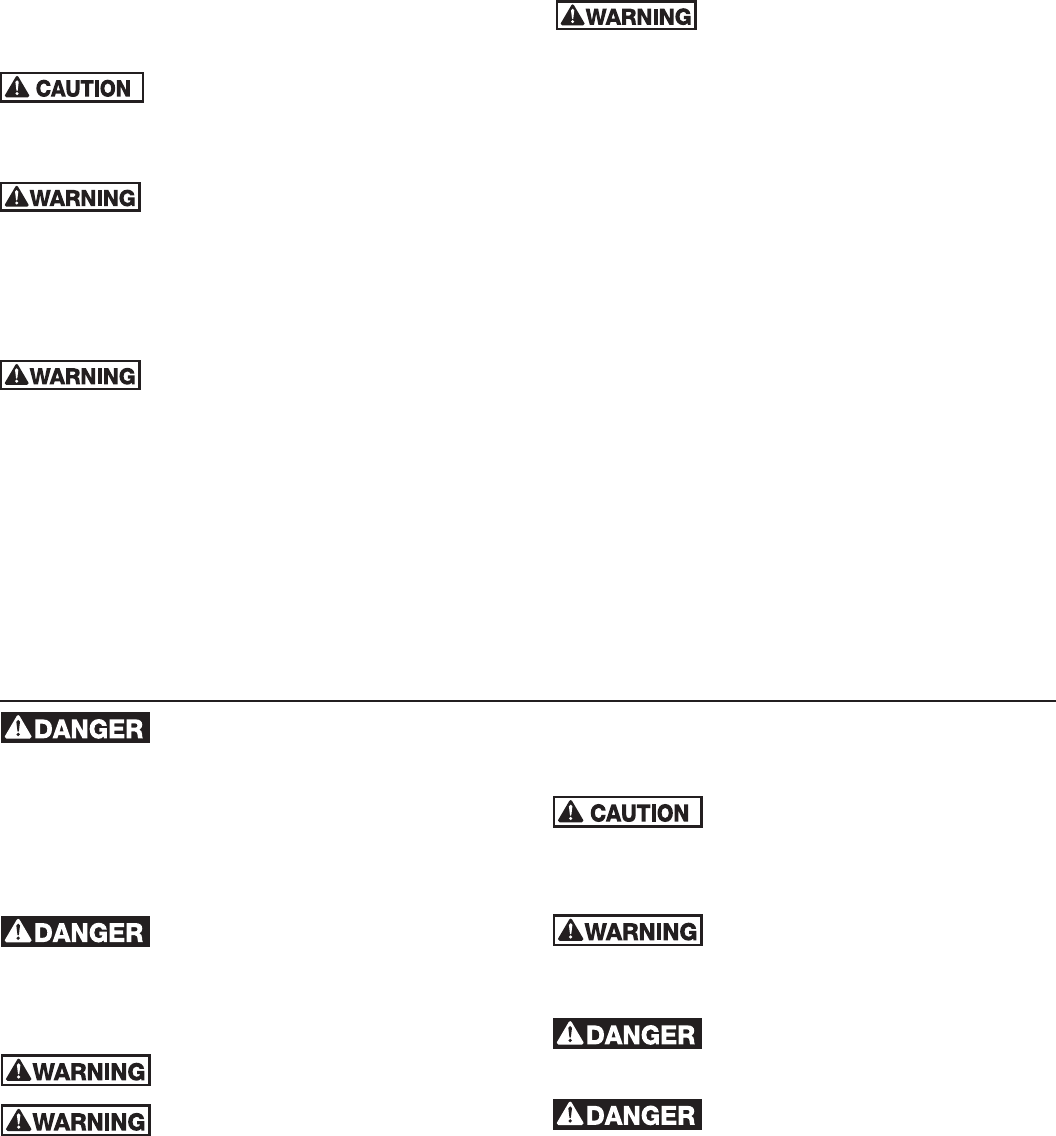
PLEASE READ THE FOLLOWING INSTRUCTIONS CAREFULLY
IMPORTANT GENERAL SAFETY INFORMATION -
ADDITIONAL SPECIFIC SAFETY ALERTS APPEAR IN THE FOLLOWING INSTRUCTIONS.
THIS PRODUCT MUST BE INSTALLED AND MAINTAINED BY
A LICENSED PROFESSIONAL PLUMBER, ELECTRICIAN, AS
APPLICABLE. IN ADDITION TO THE INSTRUCTIONS IN THIS
MANUAL, FOLLOW ALL APPLICABLE LOCAL AND STATE
CODES INCLUDING MA CMR 248 OR IN THE ABSENCE OF
SUCH CODES, THE CURRENT EDITIONS OF THE NATIONAL
PLUMBING CODE AND THE NATIONAL ELECTRIC CODE.
DRIP PAN AND DRAIN: This appliance should not be installed
in an area where leakage of the tank or connections can
result in damage to the area adjacent to the appliance or to
lower floors of the structure. When such locations cannot be
avoided, a suitable drain pan, adequately drained and kept
clear, must be installed under the appliance.
Determine whether your water is corrosive
or acidic, and that there are no suspended
solids, toxic or other substances or abnormally high chlorine
levels in the water that could damage or affect the water
heater or the rest of your plumbing system.
USE GLYCOL ONLY WITH DOUBLE-
WALLED HEAT EXCHANGER MODELS.
Glycol is a poisonous substance. To avoid seepage or
leakage of glycol to surfaces where humans or animals can
ingest it, use glycol only in double-walled units, so that any
leaks will most likely be released to the atmosphere. However,
a leak to a surface area may still occur, so any use of glycol
must be monitored closely and humans and animals should
be protected from contact with the unit.
Do not connect the water heater domestic
supply with baseboard or other space
heating units or elements. Any contaminants in the baseboard
units will contaminate the potable water in the water heater
and also adversely affect its performance.
Wiring Options. Select either a Non-Priority or
Priority System:
Two options are available when wiring the controls of the
water heater in the space heating system (boiler and
distribution elements).
1. Non-Priority System - The controls of the water heater
must be wired as a separate heating zone with a standard
zone valve or a separate circulator dedicated to the water
heater “zone”.
NOTICE: In this non-priority option, the water heater will be
supplied just as another zone. This means that if all space heating
zones call for hot boiler water at the same time, the water heater
may not be supplied with enough hot boiler water to “recover”
adequately. The delivery of domestic hot water will be diminished.
In many, but not all cases, this is not a problem because the
routine oversizing of boiler output is adequate for both loads.
2. Priority System - Under this wiring option the water heater will
be supplied before space heating.
In limited circumstances, space heating can
be lost in the home in this priority mode.
Any demand for space heating is postponed until the water
heater has reached its set temperature. This delay in
supplying the space heating zones is usually not noticed by
the inhabitants of the living spaces. However, in the event of
certain malfunctions such as circulator or thermostat failure,
space heating could be delayed indefinitely. If undetected and
uncorrected, freezing damage to piping could result.
Select Circulator versus Zone Valve
The flow of hot boiler water to the water heater can be controlled
with either a motorized zone valve or a circulator.
1. Separate circulator. The recommended way to provide
adequate flow through the water heater heat exchanger is to
use a separate dedicated circulator. This option may be used
even though the heating system utilizes zone valves.
2. Zone valve. If a zone valve is to be used, a full-port zone valve
should be used.
All installations require a low-water cut-off or automatic fill valve on
your boiler system to reduce the risk of boiler water loss.
Steam boiler installations require a low-water cut-off which is also
required by most codes.
Installation of a vacuum breaker is required to prevent damage to
the water heater when drained. There must be no valves installed
between the vacuum breaker and water heater.
SCALDING HAZARD. If the water temperature is
over 120°F, household members can suffer serious
or fatal scalding and painful and permanent injury. • The Consumer
Products Safety Commission recommends an initial setting of 120°F, but
advised that a slower response time of infants, aged, disabled and other
persons increases the scalding hazard and may require lower settings.
• Always check the water temperature before use, including washing,
bathing or showering. • Temperature limiting valves are available from your
plumbing supplier. A check valve must be installed in the boiler return line
to prevent gravity flow through the heat exchanger. This can cause
overheating and result in serious or fatal scalding.
SCALDING HAZARD. If the thermostat is not
working properly or if this product is not installed in
accordance with the manual, water temperature can reach excessive levels
that may cause serious or fatal scalding. After installation and any servicing
of the unit, verify that the thermostat is working and firmly inserted in the
thermostat well by following the thermostat testing instructions in
the manual.
Failure to use the correct replacement parts may
make your product unsafe.
In limited circumstances, space heating can be lost in
the home with unit utilizing priority mode. Any
demand for space heating is postponed until the water heater has reached
its set temperature. This delay in supplying the space heating zones is
usually not noticed by the inhabitants of the living spaces. However, in the
event of certain malfunctions such as circulator or thermostat failure, space
heating could be delayed indefinitely. If undetected and uncorrected,
freezing damage to piping could result.
If a steel hydropneumatic tank is in place, replace it
with a properly sized diaphragm expansion tank.
Otherwise, significant heat transfer problems can occur by causing air to be
trapped in the heat exchanger. If the boiler system has a diaphragm
expansion tank and the boiler temperatures are being changed, resize the
expansion tank.
If installing on city water supply, a properly sized
thermal expansion tank is required with the water
heater and should be installed as set fo rth in the product installation
manual. Contact your water supplier or local plumbing inspector for
additional information.
Prevent pressure build-up in any existing internal
tankless coil. Do not plug incoming or outgoing
tappings in the internal tankless coil plate. Leave the coil in the boiler and
leave system connections open to prevent pressure build-up.
Electrocution hazard. The water heater must be
electrically grounded. Electrical supply must come
from the boiler side of boiler’s emergency shut-off switch in order to prevent
unsafe boiler operation.
General Safety Information



